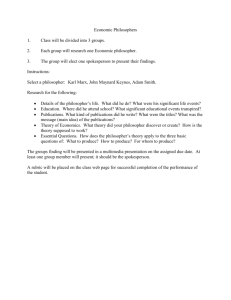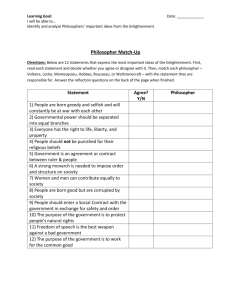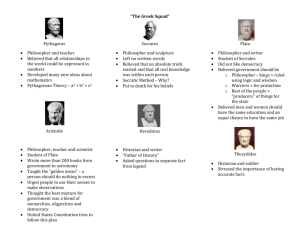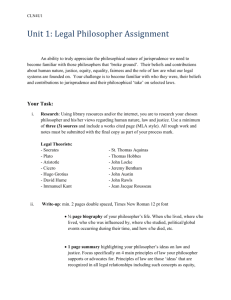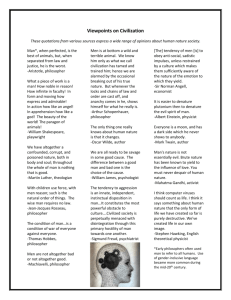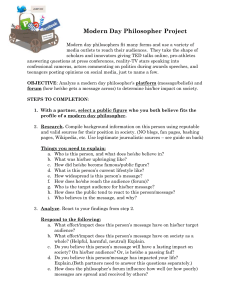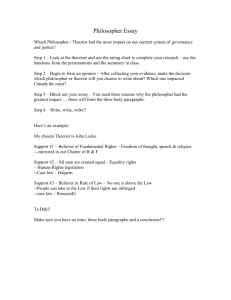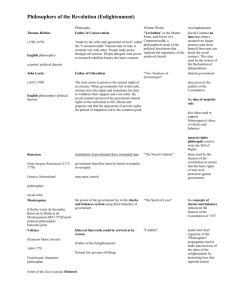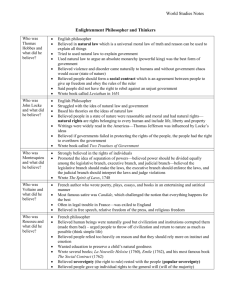About Philosophical Mindfulness
advertisement
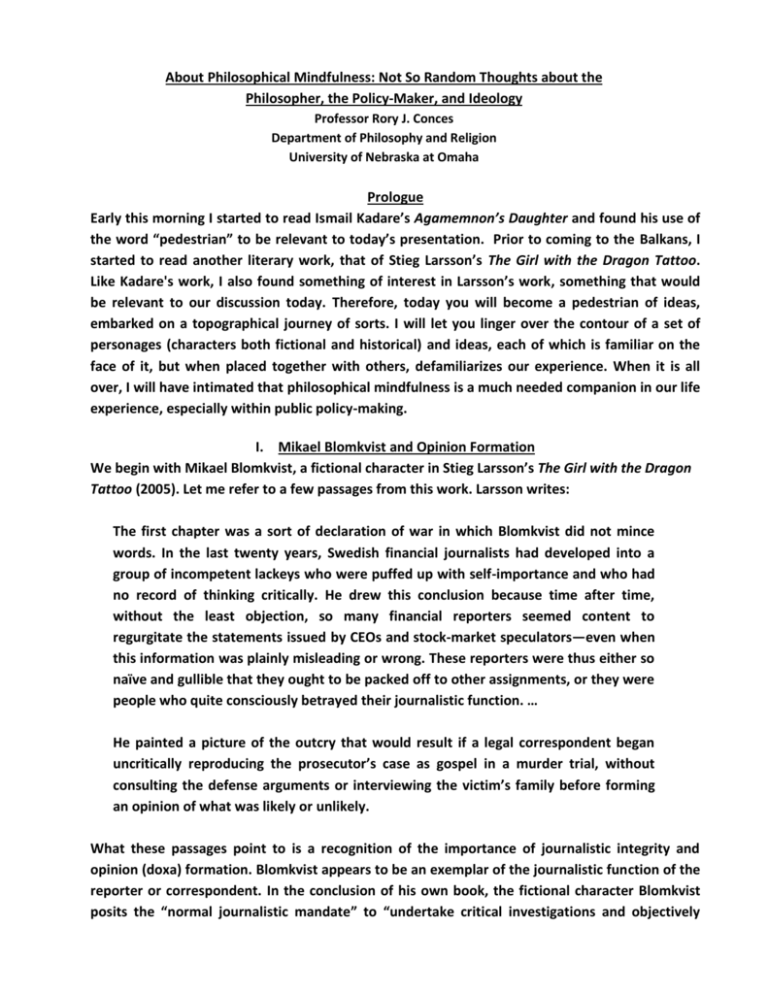
About Philosophical Mindfulness: Not So Random Thoughts about the Philosopher, the Policy-Maker, and Ideology Professor Rory J. Conces Department of Philosophy and Religion University of Nebraska at Omaha Prologue Early this morning I started to read Ismail Kadare’s Agamemnon’s Daughter and found his use of the word “pedestrian” to be relevant to today’s presentation. Prior to coming to the Balkans, I started to read another literary work, that of Stieg Larsson’s The Girl with the Dragon Tattoo. Like Kadare's work, I also found something of interest in Larsson’s work, something that would be relevant to our discussion today. Therefore, today you will become a pedestrian of ideas, embarked on a topographical journey of sorts. I will let you linger over the contour of a set of personages (characters both fictional and historical) and ideas, each of which is familiar on the face of it, but when placed together with others, defamiliarizes our experience. When it is all over, I will have intimated that philosophical mindfulness is a much needed companion in our life experience, especially within public policy-making. I. Mikael Blomkvist and Opinion Formation We begin with Mikael Blomkvist, a fictional character in Stieg Larsson’s The Girl with the Dragon Tattoo (2005). Let me refer to a few passages from this work. Larsson writes: The first chapter was a sort of declaration of war in which Blomkvist did not mince words. In the last twenty years, Swedish financial journalists had developed into a group of incompetent lackeys who were puffed up with self-importance and who had no record of thinking critically. He drew this conclusion because time after time, without the least objection, so many financial reporters seemed content to regurgitate the statements issued by CEOs and stock-market speculators—even when this information was plainly misleading or wrong. These reporters were thus either so naïve and gullible that they ought to be packed off to other assignments, or they were people who quite consciously betrayed their journalistic function. … He painted a picture of the outcry that would result if a legal correspondent began uncritically reproducing the prosecutor’s case as gospel in a murder trial, without consulting the defense arguments or interviewing the victim’s family before forming an opinion of what was likely or unlikely. What these passages point to is a recognition of the importance of journalistic integrity and opinion (doxa) formation. Blomkvist appears to be an exemplar of the journalistic function of the reporter or correspondent. In the conclusion of his own book, the fictional character Blomkvist posits the “normal journalistic mandate” to “undertake critical investigations and objectively 2 report findings to the readers.” This is in keeping with his earlier acknowledgment of the importance of opinion rather than truth. Interestingly enough, this is just the opposite of Plato’s view, which is the denunciation of opinion for absolute standards. Although unPlatonic, Blomkvist appears to be somewhat Socratic, which would make any fictional or historical character both interesting and engaging. II.Socrates: Deliberation, Thinking, and Philosophical Mindfulness The next character is Socrates. I will turn to the philosophers Gregory Vlastos and Hannah Arendt to shed light on this 5th Century Greek philosopher. Vlastos is right to point out that the Socrates of Plato’s Apology is someone who “gets under the skin of people” through his method of refutation. Known as a destructive critic, Socrates leaves his interlocutors with “shipwrecked” arguments, unsure if there is anything salvageable. But there is also Socrates the searcher or the investigator, who renounces the possession of “knowledge,” and by doing so, makes clear that anything he believes can always be further examined. Arendt, by furthering our view of Socrates, a philosopher, also enhances our understanding of the philosopher in general, that is, someone who engages in the activities of deliberation and thinking. Reasoned deliberation (the stereotypic activity of the philosopher) leads to cogent arguments, which are characterized by true premises, deductive logical validity or inductive strength, and an absence of equivocation. Whether we like it or not, we seem to have a seductive faith in reasoned deliberation, which is reflected in the fundamental claim of the Enlightenment that reason will set us free. Jürgen Habermas believes that reasoned deliberation can yield rational and, thus, decent decisions. We as human beings can come together and dispassionately and rationally move ourselves toward a better world. However, Arendt notes that rationality is not the guarantor of a peaceful and prosperous life. There is overwhelming historical evidence for this denial. For example, she points to the rationalization of terror and torture that has taken place by suicide bombers and state officials, respectively. The result is that ordinary men can reason themselves into justifying what ought to be unthinkable. One common way this occurs is through the use of the argument from the lesser evil to justify morally suspect actions. The other activity that the philosopher engages in is thinking, which Arendt believes is the only reliable source of light against evil. Unfortunately, thinking seems to be in short supply. In fact, Arendt thought that the defining characteristic of our era is that of thoughtlessness. Adolf Eichmann, for Arendt, was a case of someone who was thoughtless. 3 Thinking is essentially a silent dialogue with oneself, the power of which is captured in the following sentence: Only one who speaks with oneself will worry that in acting in an ethically inappropriate way he or she will have to live with a criminal. There are two forms of thinking: the effort to acknowledge the reality of the Other and the effort to practice empathy, the latter being a matter of imagining the Other. At times Arendt denounced empathy because she thought it was an impossible attempt to know what cannot be known—i.e., what it is like to be another person. It is impossible because one cannot be two people at the same time. At other times, however, Arendt intimated that empathy was something very different, and this is what I take to be empathy. Simply put, it is imagining how “I” would feel and think if “I” found myself in the condition or circumstances of another agent. Arendt thought that the exemplar of the thinker was none other than Socrates, for he was a gadfly (one who arouses the citizens to think or examine matters), a midwife (one who purges people of their unexamined prejudgments), and an electric ray (one who paralyzes people). Thinking frees human beings from the tyranny of established creeds and prescribed rules of conduct. It is essentially negative and not a source of moral axioms or propositions. It in no way provides us with a code of conduct. It is aimed not at destroying or transcending opinion, but at “talking something through” so that people can clarify their perspectives and improve their own opinions. It brings forth truth not by destroying opinion, but by revealing opinion in its truthfulness. Therefore, there is continuity between truth, perspective, and opinion. Thinking is crucial in both moments of emergency and moments of opportunity. Moments of emergency are when everyone is swept away unthinkingly by what everyone else does and believes in. Moments of opportunity are moments in which radically new beginnings are made possible. I believe both kinds of moments are currently at work in Kosovo. But what is the relationship of thinking to judging? Judgments associated with thinking are not calculative as those associated with reasoned deliberation. Arendt’s examples of those making such judgments clearly portray this sort of judgment as unique. In the case of at least some nonJewish Germans and Jews in Germany and elsewhere who did not participate in the Holocaust, Arendt says they simply said no to participating in the genocide. There was no deliberation resulting in a well-formed or not so well-formed argument. They simply said no because it was evil. For this to occur, however, empathy must have been experienced, including imagining those who are being harmed as people like themselves. 4 Interestingly enough, Arendt’s view of how thinking and judgment are connected appears to imply a particular view of moral performance, that is, the inflationary model of morality. According to this model, the making of moral judgments begins in moral perception, which has its basis in the emotion of empathy. Empathy, if you will, serves as the portal through which we gain entry into the moral realm. Moral perception allows us to become cognizant of wrongdoing, of people being harmed. Once that occurs, we can make a moral judgment, which can then lead to moral action. Of course, simply to perceive moral wrongdoing and to make a moral judgment that elaborates the wrongness of the perceived conduct does not mean that the individual will act. Although the rape of a woman in close proximity to a group of people may go “unnoticed” because those around her did not perceived that there was harm being done to her, it may be the case that the harm was perceived, the judgment made, but that the individuals were all unable or unwilling to act in her defense. This may also be relevant to a post-conflict society such as that found in Kosovo. In this case, the power of ideology and historical experience may be so great for many Albanians and Serbs that many members of each group will find it difficult to empathize with the Other. In such a situation, it is easier for some to treat the Others in ways that they would not otherwise engage in if empathy played a role in their moral performance. It may be that hospitality and the forced placement of groups of people within close proximity of one another may be the last resort to enhancing empathetic responses, but each of these solutions are burdened with their own set of problems. We are now ready to define philosophical mindfulness. I take such mindfulness as a dynamism of both rational deliberation and Socratic thinking that takes us to-and-fro between the level of argument and the level of conceptual framework in ways that allow us to cultivate our humanity and to condition us against evil-doing. We will see that philosophical mindfulness can play an important role in combating ideology and fanatical reasoning in public policy-making. III.Scholarly Work of the Philosopher vs. the Work of the Public Policy-Maker Perhaps it is important to look for those philosophers who have become policy-makers. One such philosopher is Dan W. Brock, who became the staff philosopher on a 1981-82 U.S. Presidential Commission for the Study of Ethical Problems in Medicine. Brock cites the philosopher and the policy-maker as having different virtues and behavior. The philosopher is interested in the unconstrained search for truth; arguments and evidence are followed regardless of their social consequences. In fact, nothing is beyond question. Reasoned deliberation and thinking seem to be at work. 5 The policy-maker, on the other hand, is primarily concerned with the consequences of their actions for public policy and those affected by that policy. As a result, the philosopher qua policymaker must shift his or her primary commitment from knowledge and truth to policy consequences. The new goal is to persuade or manipulate others in order to reach a desire outcome. The beneficial consequence of the insertion of the philosopher into policy-making is clear. The policy-maker has an agenda problem insofar as not all is immediately possible for the policymaker. Why? Because some issues are not politically feasible, it may not be the opportune time for them, or there are higher priority items to consider. Given that the philosopher has a maximally wide agenda, the philosopher can contribute to a widening of the policy agenda. Unfortunately, Brock does not fully appreciate the fact that policy-makers (and to some extent philosophers) can succumb to ideology and fanatical reasoning. Indeed, policy-makers may be extremely vulnerable to these because of the coercive (and prescriptive) nature of ideologies and the lack of sufficient philosophical mindfulness on the part of the policy-maker. IV.Ideology,Fanatical Reasoning, and the Policy-Maker The last set of ideas deals with the problem of ideology and fanatical reasoning among policymakers. Arendt’s discussion of ideology that is found in her The Origins of Totalitarianism is an insightful treatment of the subject. Although it is detailed, it can be summed up in one short expression: coercive logicality. What does this mean for Arendt? According to Arendt, ideologies work by positing a single idea (e.g., idea of ethnonationalism or class struggle) as an axiomatic premise, which unfolds in a manner that apparently comprehends the totality of the historical process. Second, ideologies emancipate their believers from experience by reducing reality to an “inner logic” that is at work behind the appearances that we come to know so well. Third, ideological thinking arranges facts into a logical procedure that does not exist in reality. If we focus on ethnonationalism qua ideology, we find that its coercive logicality is reflected in its defining Other identity ontology, xenophobic psychology, and chauvinistic morality. Ontology refers to the set of things and relationships that are said to exist in the universe. The ontology of ethno-nationalism is “hierarchical” insofar as it casts the categories of ethnicity and religion as dominant over those of citizenship and humanity. Personal and group identities are intimately bound to the Other and Otherness. Its psychology is xenophobic, which means that there is a fear of the Other, and the morality is chauvinist insofar there is a claim of moral superiority of one’s own ethnonational group. 6 This leads to fanatical reasoning, which means that the common-place restraints on belief construction and maintenance are jeopardized. But how can ideology and fanatical reasoning be dealt with by the policy-maker? The answer is through philosophical mindfulness as exhibited by the philosopher among the policy-makers and not by the philosopher qua policy-maker. This is where I part company with Brock. The problem with Brock’s idea of the philosopher becoming a policy-maker is that the philosopher must compromise his virtues and behavior. In the end, too much is lost. On the other hand, the philosopher among the policy-makers does not relinquish those same virtues and behavior. Thinking, which includes empathy towards the Other, along with reasoned deliberation, are at work. In other words, philosophical mindfulness is operative within the community of policymakers when the philosopher is among them. However, it might not be so much the philosopher as it is the hyperintellectual that can assist the policymaker, for the hyperintellectual is not only the caring insider, the critical outsider, the man of action, and the political educator, but he or she is also a non-partisan, which means that what is objectionable and defensible within each opposing camp is given voice. Perhaps this last attribute of the hyperintellectual is linked to thinking and the manifestation of empathy, as well as to two points made by J.S. Mill in On Liberty: that each perspective is a bit of the truth and that one cannot grasp one’s own position on an issue unless one grasps the others as well. In a sense, it is reflects what Michael Oakeshott referred to in “Rationalism in Politics” as epistemological modesty, which means that we must acknowledge that we do not know all that we need to know when dealing with both the natural and the social world. This becomes especially meaningful when it comes to social engineering in places like Kosovo.
